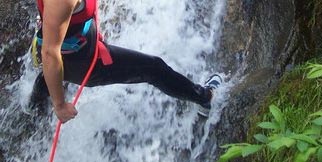
I know, why don't I write about the most difficult subject I can think of. Well, much as I would like to avoid this one, it is one of the first questions asked by anyone thinking about trying to forge a career in outdoor education. How much money can I make? The short answer is the majority will not make very much at all, but for those who apply themselves and work hard, there is a good wage to be had. I realise that probably sounds like something your teachers at school would have said, but that's because it is true and it applies to all of us. Work hard and the rewards are there.
Active outdoor jobs tend to be dominated by the young. This is perhaps because younger people have far more energy, they have less commitments – allowing them to travel more often and for longer periods of time, and the lower entry level wages are not so attractive to people who already have eye-watering mortgages to feed. There is absolutely no reason why you have to be early twenties rather than late forties to work in adventurous pursuits, indeed some activities like caving and mountaineering do tend to have an older age profile due to the length of time required to complete all the training.
The Pecking Order
To describe the hierarchy of job titles, let's take a typical multi activity centre as an example. These can range from small companies run by just a handful of people, to quite considerable organisations with hundreds of instructors and support staff. At the top of the tree are the directors, they may or may not be qualified instructors themselves, but at smaller centres they could well be.
In charge of the day to day operations of the centre will be the centre manager, who is responsible for the team of instructors. This person will almost certainly have a very strong instructing background across a wide range of activities, though they probably won't be involved in much teaching, beyond training new and existing staff.
They need to be well qualified in order to understand how the centre works at every level and will have excellent people management experience in order to organise their staff effectively. Even at a centre specialising in say, rock climbing and abseiling, you will probably find that the centre manager will have a long list of NGB (National Governing Body) qualifications, not all of which will be relevant to climbers.
Working beneath the centre manager will be the chief instructor or senior instructor. Their job will be split between instructing visitors to the centre in the range of activities being offered, as well as supervising the entry level instructors. These roles are often recruited internally; the brightest and most promising instructors being invited to work a second season and help show the new batch of instructors what is expected of them.
Finally, at the bottom rung are the trainee, junior, or simply just instructors. Fresh batches are recruited each year as most people taking a role like this will be students, either delaying entry to university, or having recently left college or graduated. Job requirements at a larger centre are likely to be less demanding; the employer more interested in your personal traits than your existing instructional prowess. If you do have some teaching experience; maybe you help at the local scout group, and you have taken part in some outdoor activities before, then so much the better.
OK, let's talk cash and put some numbers on these roles. The obvious caveat applies, every centre is different, and you could do the same job in different parts of the country or a few miles apart and get paid very different sums of money. However.
Centre Manager – You should be aiming for wages around £30,000 per year
Senior Instructor – You may be able to top £20,000 annual salary
Instructor – You should be happy with a £15,000 yearly wage
Types of activity by earning potential
We have talked about how seniority affects the amount of money you can make, but what about the differences between the actual activities. Is it financially more sensible to pursue a career on water, or in the mountains? Chances are you won't be too interested in this is you are already passionate about a certain sport, but for newcomers to the industry; those who are just starting out, it is definitely worth thinking about. A good senior manager in a brewing company may have enough transferable skills to successfully run a publishing company, but if you are a running a successful white water centre, you are unlikely to be headhunted to work as a Yachtmaster.

Do remember that there is more to working in this industry than how much money goes into your bank each month. A lot of these jobs will include accommodation and all your usual bills like heating and water. You may also get your food paid for or heavily subsidised. And then of course you have the facilities at hand to improve your skills and gain those valuable NGB awards.



